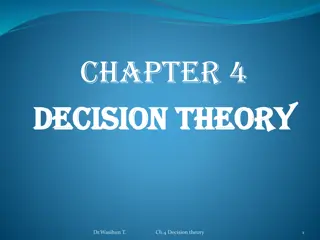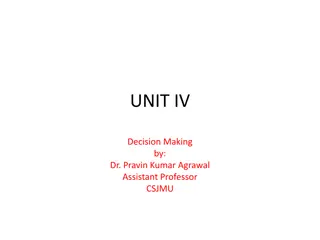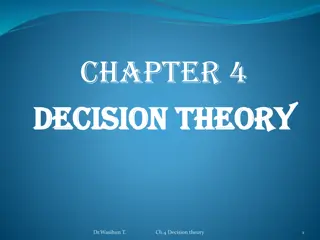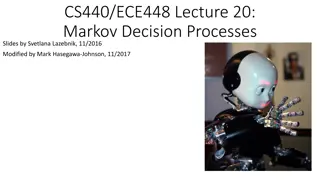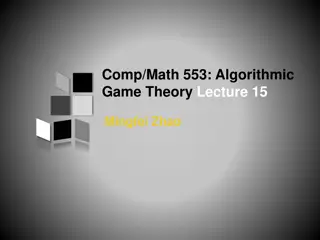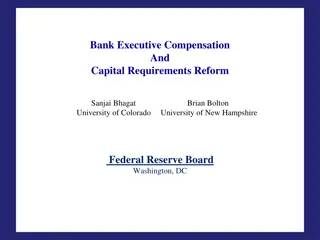Decision Theory in Business: A Comprehensive Overview
Decision theory in business involves making choices based on organizational objectives like profit maximization or cost minimization under conditions of uncertainty. This chapter covers key components such as alternatives, states of nature, payoffs, degree of certainty, and decision criteria. It exp
2 views • 41 slides
Decision-Making Process in Various Scenarios
Decision-making is crucial for individuals and organizations when selecting the best course of action among available options. This process involves considering decision alternatives, states of nature, payoffs, and using mathematical models to optimize outcomes. By identifying and defining the probl
5 views • 65 slides
Introduction to Decision Theory in Business Environments
Decision theory plays a crucial role in business decision-making under conditions of uncertainty. This chapter explores the key characteristics of decision theory, including alternatives, states of nature, payoffs, degree of certainty, and decision criteria. It also introduces the concept of payoff
5 views • 41 slides
Markov Decision Processes in Machine Learning
Markov Decision Processes (MDPs) involve taking actions that influence the state of the world, leading to optimal policies. Components include states, actions, transition models, reward functions, and policies. Solving MDPs requires knowing transition models and reward functions, while reinforcement
3 views • 26 slides
Game Theory in Networks
Exploring the concept of game theory within networks, focusing on decision-making, behaviors, and outcomes of interactions among interconnected agents. Game theory sheds light on various scenarios like pricing strategies, international relations, and evolutionary dynamics, offering insights into str
3 views • 31 slides
Game Theory: Strategies, Payoffs, and Equilibriums
Explore the world of game theory through concepts like dominant strategies, Nash equilibrium, game trees, and matrix forms. Delve into examples involving decision-making scenarios among players to grasp the intricate dynamics of strategic interactions.
4 views • 26 slides
Decision Analysis: Problem Formulation, Decision Making, and Risk Analysis
Decision analysis involves problem formulation, decision making with and without probabilities, risk analysis, and sensitivity analysis. It includes defining decision alternatives, states of nature, and payoffs, creating payoff tables, decision trees, and using different decision-making criteria. Wi
4 views • 27 slides
Interest Rate and Currency Swaps
Introduction to interest rate swaps (IR) and currency swaps, covering definitions, examples, reasons for use, valuation, payoffs, credit risk, and other swap types. Details include the concept of swaps, calculation of cash flows, and a focus on interest rate swaps with examples and cash flow illustr
2 views • 63 slides
Algorithmic Game Theory Lecture on Prophet Inequality and Auction Design
In this lecture on Algorithmic Game Theory, Mingfei Zhao discusses the Prophet Inequality and its application to single-item auctions. The lecture covers the concept of Prophet Inequality, strategies to guarantee expected payoffs, and different auction designs such as the Bulow-Klemperer Theorem and
3 views • 10 slides
New Tool for Optimal Option Portfolio Strategies by Jos Faias and Pedro Santa-Clara
The traditional mean-variance optimization approach does not work well for options due to their non-normal distribution. Jos Faias and Pedro Santa-Clara propose a new tool called OOPS (Optimal Option Portfolio Strategies) which considers high Sharpe ratios and optimal option portfolios different fro
5 views • 21 slides
Executive Compensation and Capital Requirements Reform in Banking
Explore the debate on the impact of executive incentives in banking, with conflicting views on whether they influence risk-taking decisions. Investment scenarios highlight the importance of transparency and public perception in shaping market outcomes. Testable implications shed light on CEO payoffs
2 views • 31 slides
Introduction to Game Theory - Strategic Interactions and Payoff Maximization
Game Theory is the formal study of strategic interactions where multiple agents aim to maximize their payoffs while considering their opponents' actions. This field finds applications in various domains such as economics, politics, and decision-making processes. Topics covered include games in strat
2 views • 54 slides
Government Venture Capital Programs: Enhancing Innovation Through Public Funding
Government Venture Capital (GVC) programs aim to bridge the equity gap for innovative young firms by providing funding and support. While GVCs can yield social payoffs, concerns exist about their effectiveness and potential to crowd out private investments. Direct public intervention in GVC funding
5 views • 15 slides
Goverment Venture Capital Programs: Advantages and Concerns
Venture capital (VC) firms provide valuable support to innovative young companies. However, government venture capital (GVC) programs aim to address financing gaps faced by these firms. While GVCs offer social payoffs and positive externalities, concerns exist about their effectiveness, potential cr
1 views • 13 slides
Effective Strategies for Project Proposals and Research Endeavors
This proposal outlines the importance of project proposals, providing insights into Heilmeier's Catechism for evaluating projects and advice for conducting research endeavors effectively. It emphasizes meeting feedback, discussing missed class reviews, and complying with grading criteria. The focus
1 views • 8 slides
Solving Extensive Form Games: Strategies and Equilibria
Explore the concept of Nash equilibrium in game theory, learn how to identify dominated actions, and simplify two-player zero-sum games by removing dominant strategies. Discover how players can achieve optimal outcomes by making strategic decisions based on incentives and payoffs.
0 views • 81 slides
Game Theory: Key Concepts and Information Structures
Game theory explores how decision-makers make choices, involving players, actions, strategies, payoffs, outcomes, equilibria, and information. It delves into perfect, incomplete, symmetric, and certain information structures within games.
4 views • 22 slides
Fidelity's Fifteen Minute University and Common Title Issues
Explore Fidelity's Fifteen Minute University covering topics like risky payoffs, common title issues, and the O.C.G.A. 44-14-3 method and time of cancellation. Understand penalties for improper cancellations and definitions related to revolving loan accounts.
1 views • 49 slides
Understanding Game Theory: A Strategic Analysis
Delve into the world of game theory to comprehend how rational players interact strategically, leading to outcomes shaped by their preferences, represented as utilities. Explore the concepts of zero-sum and non-zero-sum games, rules, strategies, payoffs, and equilibrium in this insightful overview.
1 views • 41 slides
